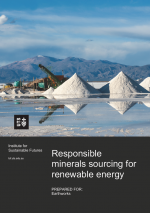Under a 100 per cent renewable energy scenario, demand for metals such as cobalt, lithium and rare earths could rise dramatically. Solar PV, wind turbines, electric vehicles and battery storage technologies require a complex mix of metals, many of which have only been previously mined in small amounts. Greater rates of recycling and the adoption of responsible sourcing is essential to ensure that the transition does not increase the already significant environmental and human impacts of mining.
A new study by ISF, commissioned by U.S. non-profit organisation Earthworks, assesses the projected mineral demand for 14 metals used in renewable energy and storage. The study links the projected mineral demand at a global scale, the potential to offset demand through recycling, supply risks and potential environmental and human rights impacts.
The potential metal demand from clean energy has been modelled against an ambitious scenario for a 100 per cent renewable electricity and transport system by 2050, that limits climate change to 1.5 degrees in line with the Paris Climate Agreement.
Key findings
As demand for minerals such as lithium and rare earths skyrockets, the already significant environmental and human impacts of mining are likely to rise steeply as well.
If manufacturers commit to responsible sourcing this will encourage more mines to engage in responsible practices and certification.
There is also an urgent need to invest in recycling and reuse schemes to ensure the valuable metals used in these technologies are recovered, so only what is necessary is mined.
- Under a 100 per cent renewable energy scenario, metal requirements could rise dramatically, requiring new primary and recycled sources
- Clean technologies rely on a variety of minerals, principally cobalt, nickel, lithium, copper, aluminium, silver and rare earths. Cobalt, lithium and rare earths are the metals of most concern for increasing demand and supply risks
- Batteries for electric vehicles are the most significant driver of accelerated minerals demand.
- Recycled sources can significantly reduce primary demand, but new mining is likely to take place and new mining developments linked to renewable energy are already underway
- Responsible sourcing is needed when supply cannot be met by recycled sources.
RESEARCH OUTPUTS
Responsible minerals sourcing for renewable energy - executive summary (2019) (Report Summary)
Responsible minerals sourcing for renewable energy - full report (2019) (Report)
Researchers
-
Research Principal
-
Research Director
-
 Sven TeskeAssociate Professor and Research Director
Sven TeskeAssociate Professor and Research Director
Year
2019
Client
Earthworks






